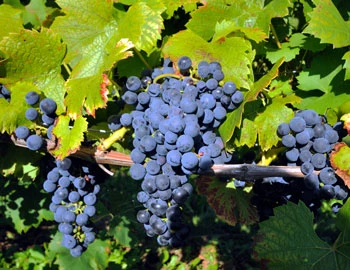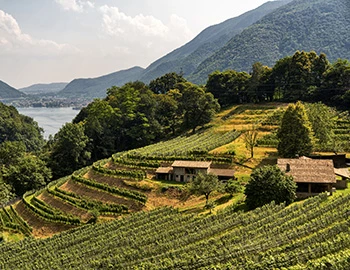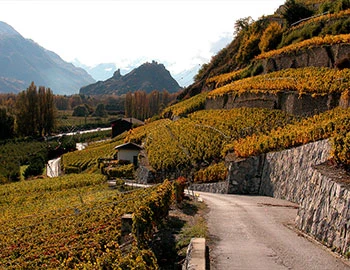
SottoSopra Spumante Brut 2019
DOC Ticino, Brivio, 750 ml

| Grape variety: | Pinot noir |
| Producer: | Brivio / Gialdi |
| Origin: | Switzerland / Tessin / Sottoceneri |
Description
A brilliant greenish-golden yellow. The bead is fine and intense with persistent bubbles. The bouquet is fresh and complex with floral notes of white fruit and aromas of peach and pear. Notes of brioche evoking a fresh yeastiness complete the nose. On palate the wine is fresh and expansive with a harmonious elegance graced by a long, dry balanced finish.
Attributes
| Origin: | Switzerland / Tessin / Sottoceneri |
| Grape variety: | Pinot noir |
| Ripening potential: | 2 to 7 years |
| Drinking temperature: | 8 to 10 °C |
| Vinification: | pressed carefully and immediately, fully destemmed, fermentation in steel tank |
| Maturation: | on the yeast |
| Maturation duration: | 32 months |
| Volume: | 13.0 % |
| Note: | Contains sulphites |
Brivio / Gialdi
For most of wine lovers in Switzerland, the name Guido Brivio is no unknown. However, abroad, it is a different story. Only after many years in the trade has he become among the wine experts and professionals of New York or London an insider tip, so to say, from an infinitesimally tiny unknown corner in the great international wine world.
Although Guido’s grandfather was a wine merchant, he didn’t grow up in this industry, or even on a wine estate. At home, life didn’t revolve around grapes, but artichokes! His mother and uncle jointly possessed the Swiss production rights for Cynar. Only after studying business in London did the young Guido decide to study oenology in Bordeaux. His mother was delighted, as she saw that a certain family tradition could now continue. There then followed a stay in Sonoma Valley, California, where he became acquainted with American wine producers’ carefree, adventurous way of working.

Pinot noir
Blueprint of the terroir
No other variety expresses its terroir as precisely as Pinot noir. It is a sensitive, fragile grape. But when it succeeds, it gives the world some of its very greatest wine plants. It especially excels in Burgundy, where it has been cultivated for at least 700 years. Even in the middle ages, it was considered so precious that it was kept separate from other grapes so as to not diminish its value. The finest examples are delicate and fragrant with aromas of cherries and red berries. With maturity, notes of forest floor, leather and truffles enter as well. An irresistible fruity sweetness still shines through, even after several decades. The Pinot noir does well in cool locations: in Switzerland and in Germany, where it is known as Blauburgunder and Spätburgunder respectively; in Alsace and in South Tyrol, in Oregon, New Zealand and Tasmania. Not least, it yields fantastic champagnes. It is a wonderful culinary companion. With its soft tannins and charming bouquet, it meshes with everything, from Güggeli and cheeses to fried fish.

Tessin
Ticino: the Merlot Mecca of Switzerland
Ticino winegrowing is thought to date from Roman times, as early as 2000 years ago. But the foundation for today’s viticulture was laid just over 100 years ago, in 1907. It was then that the first Merlot vines were planted at Castelrotto in Malcantone. Since then, the variety has emerged triumphant here. Top selections matured in barriques more than measure up to those from Bordeaux’s Saint-Émilion or Pomerol regions.

Tessin
Ticino: the Merlot Mecca of Switzerland
Ticino winegrowing is thought to date from Roman times, as early as 2000 years ago. But the foundation for today’s viticulture was laid just over 100 years ago, in 1907. It was then that the first Merlot vines were planted at Castelrotto in Malcantone. Since then, the variety has emerged triumphant here. Top selections matured in barriques more than measure up to those from Bordeaux’s Saint-Émilion or Pomerol regions.

Switzerland
Switzerland – A small country with enormous diversity
Switzerland is famous for its banks, watches, and cheese, but not necessarily for its wine. The Swiss didn't invent wine, but they have been extremely open and curious to it. Wine culture arrived in what is now modern Switzerland via several routes: from Marseilles to Lake Geneva and the Lower Valais region; from the Aosta Valley through the Great St. Bernard Pass to the rest of Valais; from the Rhone through Burgundy, across the Jura Mountains to Lake Constance; and from Lombardy to Ticino, and then on to Grisons.


